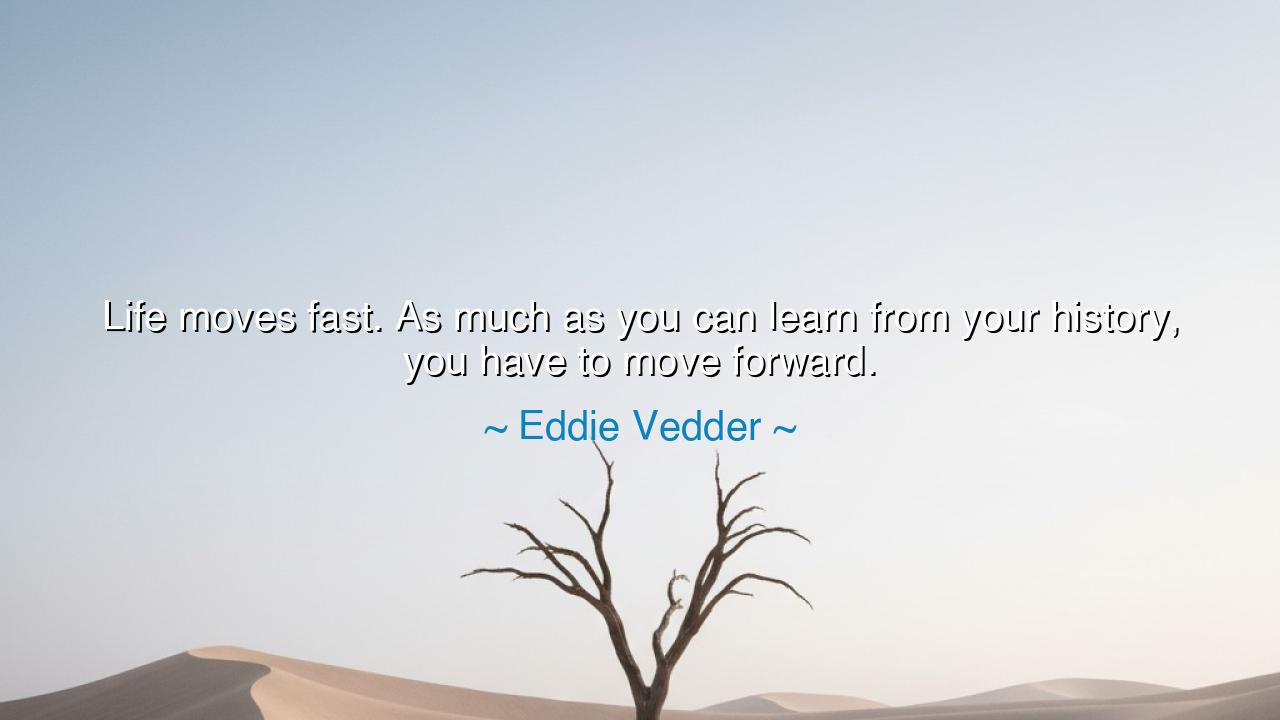
Life moves fast. As much as you can learn from your history, you






When Eddie Vedder, the soulful voice of Pearl Jam, spoke the words, “Life moves fast. As much as you can learn from your history, you have to move forward,” he uttered a truth as old as time, yet ever new in the hearts of those who live. In these few words, he gave shape to one of life’s greatest paradoxes — that while memory is a teacher, it can also be a chain; and that the art of living is to learn without lingering, to honor the past without becoming its prisoner. His words are not just advice for the weary, but a hymn to the spirit of renewal — the courage to walk onward when the winds of yesterday still whisper your name.
Vedder spoke from a place carved by both fame and pain. As the frontman of one of the defining bands of the 1990s, he had lived through the rise of grunge, the glare of adoration, and the loss of friends and peers — most famously, the tragic passing of Kurt Cobain. He saw how success could become a shadow and how nostalgia could suffocate creativity. From this furnace of experience came his wisdom: that though history offers lessons, it must not dictate the journey ahead. Life, he understood, is a current that never ceases; and those who cling too tightly to the riverbank of the past are soon left behind by its relentless flow.
The ancients, too, knew this truth. The Greek philosopher Heraclitus said, “No man ever steps in the same river twice, for it is not the same river, and he is not the same man.” This is the essence of Vedder’s message — that change is the law of existence, and to resist it is to resist life itself. One may look back upon the waters already crossed and learn from their depth or turbulence, but to stand still is to stagnate. The wise soul gathers wisdom from the past as a traveler gathers provisions — not to dwell upon them, but to be nourished as he continues on the road ahead.
Consider the story of Nelson Mandela, who, after twenty-seven years in prison, emerged not with bitterness but with purpose. He did not forget his past, nor did he deny the pain it held; but he refused to be defined by it. His history could have become a monument to suffering, yet he turned it into a foundation for reconciliation. Mandela’s life was a living echo of Vedder’s truth — that to move forward is not to erase the past, but to transcend it. For the past teaches, but only the future redeems.
In this quote, Vedder also warns against the false comfort of nostalgia. Many look backward seeking solace in what was — a time of innocence, of joy, of familiarity — but such longing blinds the eyes to the beauty of what can yet be. Nostalgia, though sweet, is a mirage; it offers warmth but steals momentum. The great task of life is to find meaning in movement — to carry history like a lantern, illuminating the path, not anchoring the feet. The past must inform, not imprison; guide, not govern.
And yet, Vedder’s call to “move forward” is not a cold rejection of memory. It is an invitation to balance — to look upon one’s history with reverence, but also with discernment. We must ask: what lessons does it offer? What burdens does it impose? And which of those burdens can we now lay down, so that our hands are free to build anew? Just as a tree cannot grow toward the sun if its roots strangle its trunk, so too can the soul not rise if it clings too fiercely to what was. Growth demands release.
So, O traveler in time, heed this wisdom: life moves fast, like the wind that shapes the mountain and the tide that shapes the shore. Do not waste your strength lamenting the footprints behind you, for the sand shifts, and the sea erases all in time. Instead, walk forward with steady heart and open eyes. Cherish your memories, learn from your failures, and give thanks for the lessons carved by time — but do not dwell there. The horizon is wide, and your journey is not yet done.
For in the end, Vedder’s words are a compass for all who seek meaning in the fleetingness of existence. “As much as you can learn from your history, you have to move forward.” The past gives wisdom; the present gives choice. The future gives possibility. To live well is to walk with all three — to remember without regret, to act without fear, and to hope without end. Thus do we honor life’s motion, and thus do we become, in the truest sense, alive.






AAdministratorAdministrator
Welcome, honored guests. Please leave a comment, we will respond soon